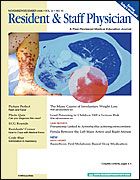Publication
Article
Resident & Staff Physician®
Top 10 Clinical Pearls in Geriatric Medicine
from the Riverside Geriatrics Fellowship Program,
Riverside Family Medicine Residency, Columbus, Ohio
This column aims to help residents recall "pearls of wisdom"before they go on a certain rotation. Use them to capitalize on the experience of others to avoid common pitfalls.
1. Serum creatinine level often does not reflect true renal function; a decline in renal clearance and lean muscle mass may make creatinine level normal. Creatinine clearance is therefore the best measurement to assess renal function.
2. White coat hypertension is more common in the elderly than in the general population, and emphasis should be placed on home blood pressure readings.
3. Elevated respiratory rate may be the earliest, and sometimes the only, presenting sign of pneumonia.
4. Always rule out fecal impaction in elderly people who are suffering from diarrhea or urinary retention.
5. Hyperthyroidism in older patients may present atypically and may mimic symptoms of hypothyroidism.
6. Hypothyroidism in the elderly may present with nonspecific symptoms and signs, such as anorexia, weakness, hearing loss, or anemia. In some elderly patients, delayed deep-tendon reflex relaxation is the only presenting sign of this condition.
Diabetes:
Analgesics:
Sedative antihistamines:
7. In general, avoid prescribing the following medications (used for the given reasons) in the elderly: Metformin (risk of metabolic acidosis in patients with renal insufficiency) Glyburide (prolonged half-life, risk of hypoglycemia), Propoxyphene and meperidine (toxic metabolites, risk of delirium and seizures), Diphenhydramine and chlorpheniramine (delirium, sedation, risk of falls, urinary retention, constipation).
8. Review the patient's medications and adherence at each visit, both prescription and over the counter, including herbal/vitamin supplementation. Inquire about adverse drug reactions, drug-drug interactions, and drug- disease interactions.
9. Review/determine advance care directives (ie, Durable Power of Attorney for Health Care, Living Will, code status). Do this at a routine visit rather than during a health crisis.
10. In the elderly, fever and leukocytosis may be absent even with significant infections (eg, pneumonia, pyelonephritis).
